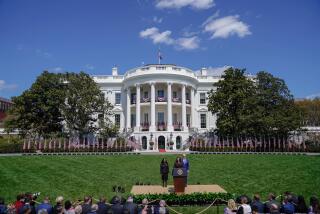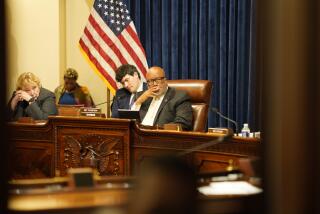CIA Seeks More Time for Drug Inquiry
- Share via
WASHINGTON — The chief in-house investigator at the Central Intelligence Agency told a Senate committee Wednesday that he will need more time than first expected to complete his inquiry into whether the CIA was connected with the introduction of crack cocaine to the United States.
“The size of the information base that must be thoroughly reviewed . . . is enormous,” CIA Inspector General Frederick P. Hitz said at a packed hearing of the Senate Select Committee on Intelligence.
Last month, CIA Director John M. Deutch assigned Hitz to complete the review by the first week of November. But Hitz said Wednesday that the huge number of documents still to be collected and examined makes a quick outcome impossible.
Hitz called the allegations of CIA involvement in narcotics trafficking “the most controversial, politically charged and potentially damaging of any that we’ve looked at.”
As of now, he said, there is “no evidence” that the CIA played a role in introducing crack cocaine to the United States.
Hitz also noted that he does not have the power to force the disclosure of agency documents or to compel CIA employees to answer questions, as would a prosecutor.
The chairman of the committee, Sen. Arlen Specter (R-Penn.), urged Hitz to retain more staff members to accelerate the review. If necessary, Specter said, he will consider having the committee conduct an investigation of the allegations, made two months ago by the San Jose Mercury News.
The newspaper said that a Los Angeles drug dealer, “Freeway” Ricky Ross, in tandem with two Nicaraguan cocaine traffickers who in the 1980s supported the CIA-backed Contra rebels, opened the “first pipeline” of cocaine to black neighborhoods of Los Angeles.
The paper also said that the traffickers sent millions of dollars in drug profits to the Contras.
The executive editor of the Mercury News has now conceded that Ross and the Nicaraguan traffickers did not establish the first pipeline of cocaine to South-Central Los Angeles. The Mercury News reporter who wrote the articles, Gary Webb, told National Public Radio’s “Talk of the Nation” that the Contras “probably . . . were not getting a lot of money” from the drug sales.
Also Wednesday, Michael R. Bromwich, the Justice Department’s inspector general, told the committee that he intends to conduct a thorough review of another, related allegation made by the Mercury News: that the CIA or other national security interests stymied criminal investigations of the Nicaraguan drug traffickers.
Bromwich, who attended a community meeting last weekend in Los Angeles regarding the allegations, noted that he helped prosecute Lt. Col. Oliver L. North, the former White House aide involved in the Iran-Contra arms-for-hostages scandal during the Ronald Reagan administration.
While making clear his determination to find the truth, Bromwich also said that he does not have the power to compel Justice Department employees to answer questions. But Bromwich said that he does have the power to subpoena department documents.
The audience at Wednesday’s hearing, which included activist Dick Gregory and Rep. Maxine Waters (D-Los Angeles), voiced criticism of the CIA. The crowd repeatedly ignored Specter’s calls for decorum and shouted skeptical remarks at the CIA’s Hitz and the three senators who were present.
One of those, Sen. Bob Kerrey (D-Neb.), urged the audience not to let emotion overcome the evidence and to withhold judgment until more facts are known.
“This is a very inflammatory subject, to say the least,” Kerrey said. “We have a duty to get to the bottom of these allegations.”
More to Read
Get the L.A. Times Politics newsletter
Deeply reported insights into legislation, politics and policy from Sacramento, Washington and beyond. In your inbox twice per week.
You may occasionally receive promotional content from the Los Angeles Times.











